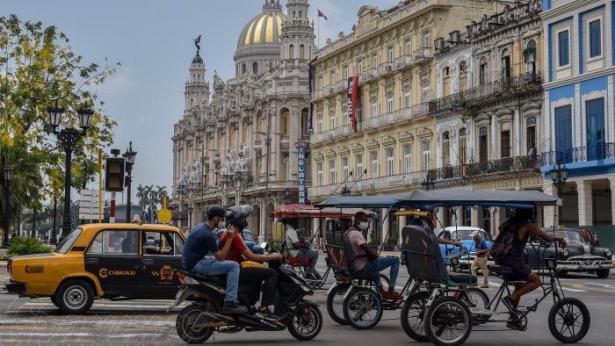The old-style information war that we have been experiencing for this last week against Cuba, did not start with Biden. Since 2017, the US has been incessantly and inaccurately talking about a social explosion in Cuba with its magical solution of a “humanitarian intervention.” At the same time, Trump progressed in his litany of adding more sanctions to the blockade, 243 to be exact, which have been kept intact by the current administration.
In February 2020, the friends of Luis Almagro, Secretary-General of the OAS, and the Florida congressmen, in between taking selfies with the most despicable fascists of the far-right, launched a social media campaign called “Crisis in Cuba: Repression, Hunger, and Coronavirus.” At that moment, there wasn’t a single case of COVID-19 on the island. Nor was there a lack of, as there is now, of food or medicine. This was despite the successive blows to finances, pressure on banks, the persecution of ships with oil, the abrupt cutoff of remittances, the cancellation of regular flights from the United States and many more. As the Cuban writer René Vázquez Díaz put it recently, imagine the army of US government officials who have worked tirelessly since 1960 to make Cuban children, the elderly and the sick, women and men suffer the unspeakable in a small country that has never attacked its executioner. Imagine the massive number of US government officials who, now more than ever, continue to carry out that daily work.
Imagine for a moment the cost of this full-spectrum war that operates in cyberspace. They connect and share information with all their operatives working in “real-time” to ensure that the social unrest passes from a promising potential to something that seems plausible. This happens without ever mentioning the hand that has rocked the cradle. And without revealing, of course, that the majority of the Cubans did not participate in the protests and will not accept, in any way a “humanitarian intervention” nor the bombs and marines that accompany it.
When the Cuban government called the people to defend their revolution, the signal was given on social media and international media to turn President Miguel Díaz-Canel into a criminal. They forgot to mention that the President didn’t call the army to shoot at citizens or inflict ocular injures or use electric batons and water tanks with acid or tear gas or any other weapon. The majority in Cuba know who the actual criminal in this story is.
And they came out to defend the Revolution even before Diaz-Canel explained on Sunday afternoon what was happening and called for calm amid a bombardment of oceans of toxic information and fake news of all kinds on social media. Just one small example of this, a report this week by CNN in Spanish presented a demonstration of support of the Revolution by the workers of the Ministry of Economy in Havana, as if it were an anti-government protest. To make it more realistic, they added the song “Libertad” by Miami businessman Emilio Estefan.
What mainstream media also leaves out in their reports is that there is documented participation of Florida companies and websites in the organization of this campaign that has US government funding. Comprehensive reports have also come out on the use of big data and state-of-the-art artificial intelligence systems against the island, similar to the ones they used to justify the coup in Bolivia. Analysts also documented the existence of digital cyber troops that coordinate actions on social media and use computer intelligence systems to generate a noisy echo chamber against the Cuban government. But all of this has somehow not been mentioned.
The Spanish researcher, Julián Macías Tovar, has shown how these cyber troops organized on Twitter, amplified millions of messages and gave instructions for coordinated harassment of influencers to give volume to the #SOSCuba hashtag. The tactics that have been used, typical of a cyberwar operation, were intended to generate the artificial illusion of a large-scale consensus against the Cuban government. It is a carefully planned operation of brute force in the social platforms which brings together all the characteristics of the irregular or hybrid warfare of American design in Internet time, which takes almost 20 years of practice.
In 2003, the US Department of Defense declared cyberspace as a new territory for conquest. It defined the operations of Network Centric Warfare, or cyberwar, described as ” conducting and preparing to conduct military operations in accordance with the principles related to information. It means disrupting, if not destroying, information and communication systems, broadly defined to also include military culture, on which an adversary relies to “know” himself: who he is, where he is, what he can do, when you can do it, why you are fighting, what threats to counter first, etc.” Misinformation, fraud, and manipulation try to turn scenarios created in American laboratories into social unrest. They also turn viewers into accomplices of a crime against millions of Cubans. Many things are not said about Cuba but without a doubt this one is crucial.
Rosa Miriam Elizalde is a Cuban journalist and founder of the site Cubadebate. She is vice president of both the Union of Cuban Journalists (UPEC) and the Latin American Federation of Journalists (FELAP). She has written and co-written several books including Jineteros en la Habana and Our Chavez. She has received the Juan Gualberto Gómez National Prize for Journalism on multiple occasions for her outstanding work. She is currently a weekly columnist for La Jornada of Mexico City.
This article was first published in La Jornada.


Spread the word